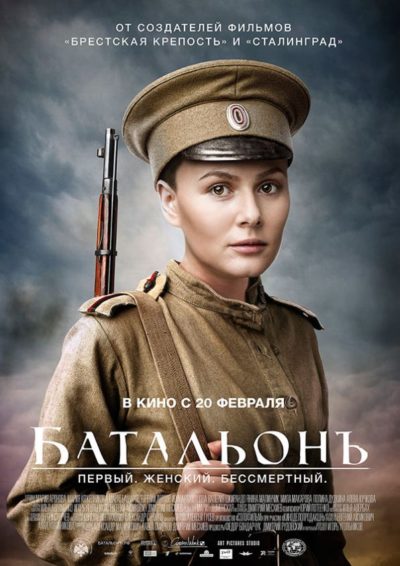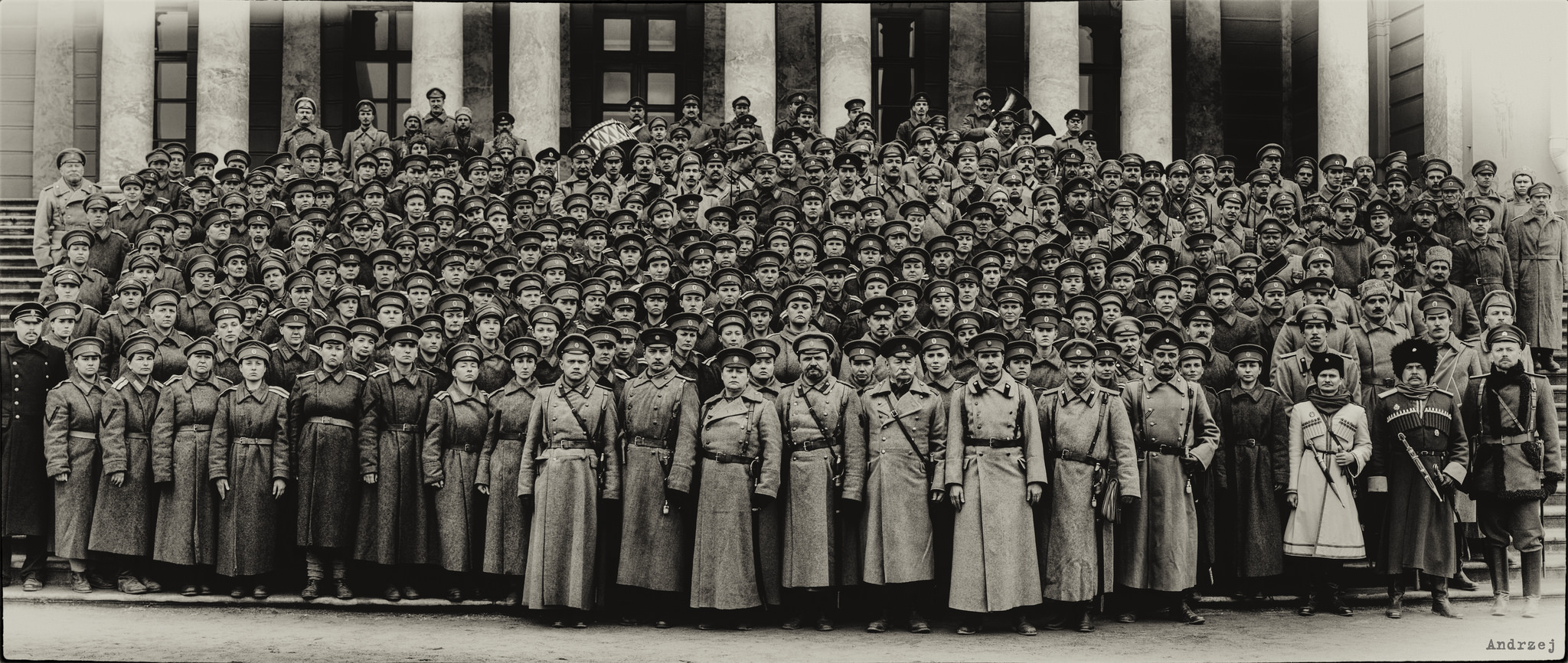 We’ve previously written about the Soviet Union’s wholehearted embrace of women soldiers in World War II, but it was not the first time Russia had gone to the female well in defense of their nation. Almost a century ago, while the country was going through a turbulent transition out of Tsarism, combat battalions consisting entirely of women were formed, to fight against Germany in the latter stages of the Great War. At a time when women were not quite yet able to vote in Russia – suffrage would come there, later in 1917 – this was still more advanced in terms of equality on the battlefield, than the United States is currently.
We’ve previously written about the Soviet Union’s wholehearted embrace of women soldiers in World War II, but it was not the first time Russia had gone to the female well in defense of their nation. Almost a century ago, while the country was going through a turbulent transition out of Tsarism, combat battalions consisting entirely of women were formed, to fight against Germany in the latter stages of the Great War. At a time when women were not quite yet able to vote in Russia – suffrage would come there, later in 1917 – this was still more advanced in terms of equality on the battlefield, than the United States is currently.
The purpose of the units was initially for morale purposes. The long grind of the trench-warfare which characterized World War I on the Western front is well-known, but the situation was no different in the East, where the Germans and Russians were locked in a lethal stalemate of artillery bombardments, poison gas attacks and futile assaults which gained trivial amounts of territory at horrendous cost. As the government collapsed, the Tsar abdicating in March 1917, army morale went with it. Soldiers no longer answered to their officers, and spent more time fraternizing with the enemy than fighting them. However, many volunteers still wanted to defend their homeland, and these were organized into groups, in the hope of energizing and/or shaming the regular forces into picking up their arms again.
These volunteers were not just male. On the women’s side, the front runner was Maria Bochkareva, who had already been a trail-blazer in the field of female combat. At the outbreak of the war, she had obtained the personal authorization of the Tsar to join the regular army, and served almost three years there, being both wounded and decorated on multiple occasions. However, growing disenchanted with the collapse in discipline, she quit the army, but shortly after requested permission to organize a group of women. Speaking to the Russian Parliament, she said: “You heard of what I have gone through and what I have done as a soldier. Now, how would it do to organize women like me to serve as an example to the army and lead the men into battle?”
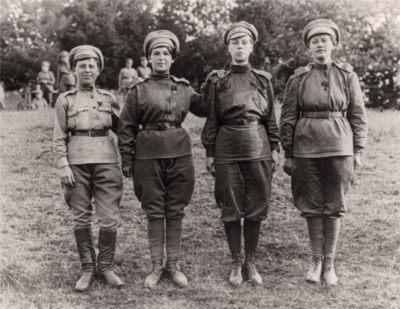 There were 2,000 volunteers initially, but Bochkareva’s strict approach to discipline winnowed out 85% of these. Part of her disenchantment with the regular military was that it was now largely run by “soldier’s committees”, with discipline severely restricted, and even mutineers could no longer be executed. She insisted that her battalion had to be committee-free, run on old-school lines, and this caused conflict, both with the military hierarchy and many of her recruits. But she persevered: the women who stayed were shorn of all their feminine fripperies (as shown in the contemporary photos) and given intensive instruction under male trainers and support staff. A month later, led by Bochkareva, the 1st Russian Women’s Battalion of Death were sent to the front, and took part in the Kerensky offensive.
There were 2,000 volunteers initially, but Bochkareva’s strict approach to discipline winnowed out 85% of these. Part of her disenchantment with the regular military was that it was now largely run by “soldier’s committees”, with discipline severely restricted, and even mutineers could no longer be executed. She insisted that her battalion had to be committee-free, run on old-school lines, and this caused conflict, both with the military hierarchy and many of her recruits. But she persevered: the women who stayed were shorn of all their feminine fripperies (as shown in the contemporary photos) and given intensive instruction under male trainers and support staff. A month later, led by Bochkareva, the 1st Russian Women’s Battalion of Death were sent to the front, and took part in the Kerensky offensive.
The women saw action near the town of Smarhon, and accounts indicate they performed well, along with the other “shock troops”, and Russian forces initially were able to gain ground. However, the regular army barely showed up, and the Germans regrouped, taking back the territory and then some. This failure marked the last significant Russian action of the war. Bochkareva was injured once more, and sent back to recuperate. However, if her acts had minimal impact on the soldiers they were intended to inspire, they did help create as many as fifteen other women’s battalions, some evolving from existing units. Most of these did not see the war, but in October, the 1st Petrograd Women’s Battalion did join regular Cossack troops in the defense of the Winter Palace against Bolshevik forces. Though history records, that didn’t end well either.
It was likely a concept too far ahead of its time, and as Russia descended into anarchy and chaos, the struggle to keep the battalions supplied and organized proved an unequal one. For a while, they served in auxiliary roles behind the front lines, but the death knell came on November 30, 1917 when the new Bolshevik government officially dissolved the units. Those who had been members were free to go, but a number stayed in action, fighting on both sides during the looming Russian Civil War. That included Bochkareva. While holding no great love for the Tsar, she was thoroughly unimpressed with the Communist regime, and toured America and the United Kingdom in 1918 soliciting support against them. On her return to Russia, she tried to organize a further women’s unit as part of the White Army, but was captured by the Bolsheviks, and executed by firing squad in May 1920, at the age of thirty.
Yashka: My Life as Peasant, Exile, and Soldier
“Woman is naturally light-hearted. But if she can purge herself for sacrifice, then through a caressing word, a loving heart and an example of heroism she can save the motherland. We are physically weak, but if we be strong morally and spiritually, we will accomplish more than a large force.”
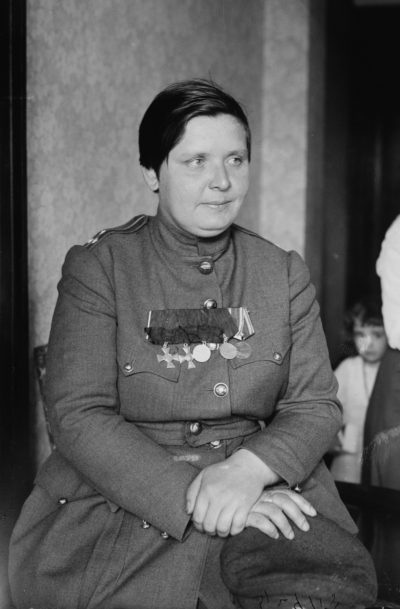 It’s likely Bochkareva would have fallen into the darkness of historical obscurity, a nine days’ wonder from late in the Great War, except for her trip to the West to rally support against the Bolsheviks. While here, she worked with Russian-born writer, Isaac Don Levine, on her autobiography, telling her story to him over 100 hours and three weeks of interviews, which he translated and transcribed. The resulting book is the source for virtually everything we know about her life to that point, though obviously skips its tragic conclusion, in front of a Communist firing-squad. As such, it largely has to be taken on faith, since there’s little or no corroborating evidence available. Occasionally, it does feel stretched, in a /r/thathappened way, with Bochkareva adored and feted to a suspicious degree. But there’s a lot here, too, which has the ring of authenticity – her depictions of the hell which was the trenches, for example, sounds very much like direct experience.
It’s likely Bochkareva would have fallen into the darkness of historical obscurity, a nine days’ wonder from late in the Great War, except for her trip to the West to rally support against the Bolsheviks. While here, she worked with Russian-born writer, Isaac Don Levine, on her autobiography, telling her story to him over 100 hours and three weeks of interviews, which he translated and transcribed. The resulting book is the source for virtually everything we know about her life to that point, though obviously skips its tragic conclusion, in front of a Communist firing-squad. As such, it largely has to be taken on faith, since there’s little or no corroborating evidence available. Occasionally, it does feel stretched, in a /r/thathappened way, with Bochkareva adored and feted to a suspicious degree. But there’s a lot here, too, which has the ring of authenticity – her depictions of the hell which was the trenches, for example, sounds very much like direct experience.
It takes a while to reach that, beginning with her early life as the daughter of a peasant family. Put to work while still only aged eight, she was married at 15, but her first husband was an abusive alcoholic, and she left him. Thereafter, she had jobs ranging from laundry to construction foreman, and allegedly had a narrow escape from a life of prostitution [looking at her pictures, I have to say, that… seems a bit unlikely?]. She also met Yakov Buk, with whom she began a common-law marriage, but he fell foul of the tsar’s secret police and was exiled to Siberia, Maria accompanying him there. After some more implausible adventures – one chapter is titled “Snared by a Libertine Governor”! – war broke out, and according to our heroine, “My heart yearned to be there, in the boiling caldron of war, to be baptized in its fire and scorched in its lava. The spirit of sacrifice took possession of me. My country called me. And an irresistible force from within pulled me.”
Returning to Tomsk, she applied to join the army – while turned down, she made such a good impression on the local commander that he drew up a telegram to the Tsar with his own recommendation. To the surprise of all, the Tsar authorized her enlistment, and this is where the story takes off, offering a glimpse into the front-lines from a very personal perspective. Initially, Bochkareva was eager to see battle: “Were we nervous? Undoubtedly. But it was not the nervousness of cowardice, rather was it the restlessness of young blood. Our hands were steady, our bayonets fixed. We exulted in our adventure.” Bochkareva was injured and also, briefly, captured by Germans, but fought free, according to her account:
We threw ourselves, five hundred strong, at our captors, wrested many of their rifles and bayonets and engaged in a ferocious hand-to-hand combat, just as our men rushed through the torn wire entanglements into the trenches. The confusion was indescribable; the killing merciless. I grasped five hand-grenades that lay near me and threw them at a group of about ten Germans. They must have all been killed. Our entire line across the river was advancing at the same time. The first German line was occupied by our troops and both banks of the Styr were then in our hands. Thus ended my captivity. I was in German hands for a period of only eight hours and amply avenged even this brief stay.
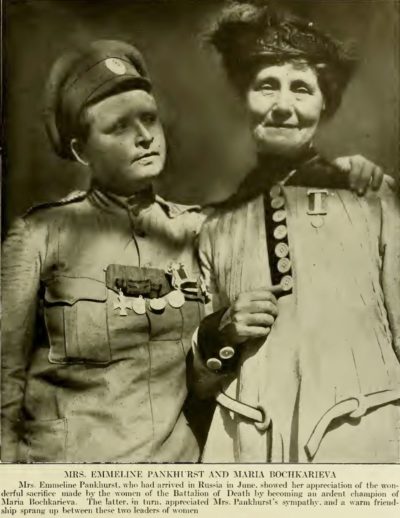 She eventually realized the upper levels of command lacked the same mettle and commitment, resulting in failed offensives. This undercut army morale, and as the civil turbulence within Russia increased, this also reduced the will to win – not helping matters, were German soldiers, crossing the lines bearing brandy. Eventually, Bochkareva grew so disenchanted, she quit the military in May 1917: “I can’t stand this new order of things. The soldiers don’t fight the Germans any more. My object in joining the army was to defend the country. Now, it is impossible to do so. There is nothing left for me, therefore, but to leave.”
She eventually realized the upper levels of command lacked the same mettle and commitment, resulting in failed offensives. This undercut army morale, and as the civil turbulence within Russia increased, this also reduced the will to win – not helping matters, were German soldiers, crossing the lines bearing brandy. Eventually, Bochkareva grew so disenchanted, she quit the military in May 1917: “I can’t stand this new order of things. The soldiers don’t fight the Germans any more. My object in joining the army was to defend the country. Now, it is impossible to do so. There is nothing left for me, therefore, but to leave.”
This retirement was short-lived, because she quickly came up with the idea of the Women’s Battalion of Death, as described above, eventually leading it into battle. She sustained its strict discipline herself, berating offenders: “You are not worth the uniforms you are wearing. This uniform stands for noble sacrifice, for unselfish patriotism, for purity and honor and loyalty. Every one of you is a disgrace to the uniform. Take them off and get out!” She recounts that when she came across one of her girls making love to another soldier, she bayoneted the girl to death – the man, wisely, ran off before suffering the same fate! However, the rest of the army had a laxer approach. Bochkareva and her soldiers became seen as reactionaries, with some even lynched; it eventually became necessary to disband the unit to prevent further casualties.
Bochkareva’s adventures were not over, as she became a messenger for the anti-Bolshevik forces. She was captured by their opponents, on the way back from meeting General Lavr Kornilov, and the account of her near-execution is chilling – not least, in view of its likely eventual occurrence: “We were surrounded and taken toward a slight elevation of ground, and placed in a line with our backs toward the hill. There were corpses behind us, in front of us, to our left, to our right, at our very feet. There were at least a thousand of them. The scene was a horror of horrors. The poisonous odors were choking us. The executioners did not seem to mind it so much. They were used to them.” While she escaped this fate, in part because one of the committee members had been rescued by her earlier in the war, that was it, and she opted to leave the country, going through Siberia to Vladivostok.
It’s an interesting read, offering a unique perspective on the Russian Revolution and war, though at times, it seems we are hearing more of Levine’s voice than Bochkareva, who hardly sounds like the uneducated peasant girl described. On the other hand, his filtering likely ensures events are explained in a way which makes sense for the intended Western audience; this probably helps equally, with regard to the near-century in time which has elapsed. Despite the yawning chasm in era and location between author and reader, this should be perfectly intelligible to the modern citizen. Certainly, Bochkareva comes over as a true heroine: strong-minded, prepared to go to any lengths to achieve her goals, and an irresistible force. Emmeline Pankhurst, doyenne of the suffragette movement, called her the greatest woman of the century, comparing Bochkareva to Joan of Arc. If premature, considering more than four-fifths of the century was in the future at that point, she still deserves to be considered one of its greatest unsung heroines.
Author: Maria Bochkareva, as told to Isaac Don Levine
Publisher: Frederick A. Stokes, 1919 – available, in full and for free, online.
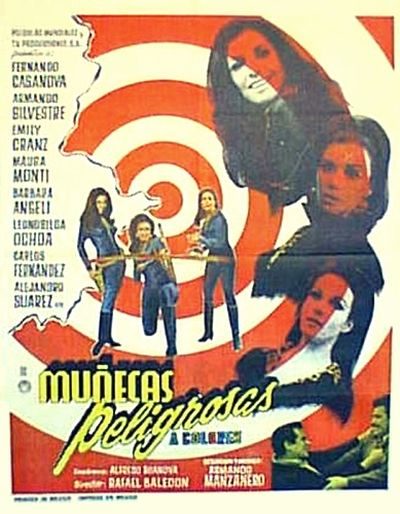 Not far removed from Peligro… Mujeres en acción!, this is actually a sequel to Con Licencia para Matar, which I’m still seeking in a subtitled format. Some day… While nominally starring Fernando Casanova as agent Jim Morrison (maybe The Doors weren’t big in Mexico?), this is really about the Tigresses, a freelance group of female bodyguards, with a fetching line in black catsuits. There’s leader Emily (Cranz), associates Barbara (Angela) and Diana (Monti) and Tigress in training, Leonor (Ochoa), experts variously with a gun, bow, sword and fists. Jim brings them on board to help protect scientist Professor Livingson, the inventor of a key ingredient in rocket fuel, K-20; he’s travelling to Mexico to update its manufacturing plant. That will expose him to Garrick (Armando Silvestre), a villain who wants the secret of K-20 for himself, and it’s up to Jim and the ladies to protect the Professor.
Not far removed from Peligro… Mujeres en acción!, this is actually a sequel to Con Licencia para Matar, which I’m still seeking in a subtitled format. Some day… While nominally starring Fernando Casanova as agent Jim Morrison (maybe The Doors weren’t big in Mexico?), this is really about the Tigresses, a freelance group of female bodyguards, with a fetching line in black catsuits. There’s leader Emily (Cranz), associates Barbara (Angela) and Diana (Monti) and Tigress in training, Leonor (Ochoa), experts variously with a gun, bow, sword and fists. Jim brings them on board to help protect scientist Professor Livingson, the inventor of a key ingredient in rocket fuel, K-20; he’s travelling to Mexico to update its manufacturing plant. That will expose him to Garrick (Armando Silvestre), a villain who wants the secret of K-20 for himself, and it’s up to Jim and the ladies to protect the Professor.
























 The above is an equal-opportunity truism and, as we see here, applies just as much to the first matriarchal unit in the modern world. This was the charmingly-named 1st Women’s Battalion of Death, created late in World War I, as the Russian Revolution was taking place. Its aim was to encourage the disillusioned regular army into continuing the fight against Germany, in a “If the ladies are fighting, surely you should be, too?” kinda way. At least initially, it’s the story of two sisters, Nadya (Kuchkova) and Vera, daughters of a rich family, who volunteer for the unit after Vera’s fiance, Petya, is killed at the front. Their mother sends their maid, Froska (Rahmanova), to try and protect her daughters, as they go through the training that will turn them into soldiers capable of taking on the enemy. The film climaxes with an initially successful, but ultimately futile, offensive – while the women initially gain ground, the regular army’s morale is so broken, they don’t support the push, allowing the Germans to counterattack [this aspect is largely true to history].
The above is an equal-opportunity truism and, as we see here, applies just as much to the first matriarchal unit in the modern world. This was the charmingly-named 1st Women’s Battalion of Death, created late in World War I, as the Russian Revolution was taking place. Its aim was to encourage the disillusioned regular army into continuing the fight against Germany, in a “If the ladies are fighting, surely you should be, too?” kinda way. At least initially, it’s the story of two sisters, Nadya (Kuchkova) and Vera, daughters of a rich family, who volunteer for the unit after Vera’s fiance, Petya, is killed at the front. Their mother sends their maid, Froska (Rahmanova), to try and protect her daughters, as they go through the training that will turn them into soldiers capable of taking on the enemy. The film climaxes with an initially successful, but ultimately futile, offensive – while the women initially gain ground, the regular army’s morale is so broken, they don’t support the push, allowing the Germans to counterattack [this aspect is largely true to history].